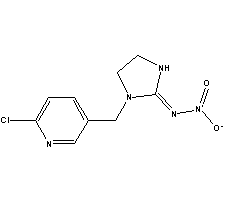Insecticides Imidacloprid 20%SL,35%SC,70%WDG
Inquiry
| Post Date: | Dec 02,2013 |
| Expiry Date: | Dec 02,2014 |
| Detailed Description: |
Cas No. :138261-41-3
Quantity: 100Metric Tons Payment Method: L/C 1.Imidacloprid 97%TC,20%SL,35%SC,70%WDG 2.With high quality at competitive price 3.directly delivery from factory Name of Product Imidacloprid Chemical Name 1-((6-Chloro-3-pyridinyl)methyl)-N-nitro-imidazolidinimine Molecular Weight 255.7 Formulation 97%TC, 20%SL,35%SC,70% WDG Property A colorless crystalline, the vapor pressure 0.2μPa(20), the density of 1.543 (20 ° C). Solubility (20 ° C) : Water 0.51 grams / liter, dichloromethane 50-100 grams / liter,.Isopropanol 1-2 grams / liter, toluene 0.5-1 grams / liter, hexane <0.1 grams / liter.Stability: In normal storage conditions,in neuter and acidic medium is stable, in alkaline water medium environment will slow decompose. Toxicity Rats (male and female), the acute oral LD50 about 1260mg / kg, acute skin LD50 above 1000mg/kg, no stimulation to the rabbit eyes and skin. Application object Widely used in cotton, vegetable, fruit, rice, wheat, etc Control object Effectively prevent aphids, leafhoppers and other pests, etc Preparation process Stir the toluene solution of N - (2 - chloro - 5 - methyl pyridine) ethyl diamines under room temperature, add hydrobromic acid, and obtain circular compounds. Then add concentrated sulfuric acid to the circular compounds under 0. Finally,add fuming nitric acid to reaction mixture and stir it for two hours under 0. Application to trees When used on trees, it can take 30 – 60 days to reach the top, (depending on the size and height) and enter the leaves in high enough quantities to be effective. Imidacloprid can be found in the trunk, the branches, the twigs, the leaves, the leaflets, and the seeds. Many trees are wind pollinated. But others such as fruit trees, Linden, Catalpa, and Black Locust trees are bee and wind pollinated and imidacloprid would likely be found in the flowers in small quantities. Higher doses must be used to control boring insects than other types. |
| CAS Registry Number: | 138261-41-3 |
| Synonyms: | ;1-((6-Chloro-3-pyridinyl)methyl)-N-nitro-imidazolidinimine;((6-Chloro-3-pyridinyl)methyl)-N-nitro-2-imidazolidinimine,96% imidacloprid TC;1-(6-chloro-3-pyridylmethyl)-N-nitroimidazolidin-2-ylideneamine;1-[(6-chloro-3-pyridinyl)methyl]-N-nitro-2-imidazolidinimine;(EZ)-1-(6-Chloro-3-pyridylmethyl)-N-nitroimidazolidin-2-ylideneamine;1-((6-chloro-3-pyridinyl)methyl)-4,5-dihydro-N-nitro-1H-imidazol-2-amine;1-((6-Chloro-3-pyridinyl)methyl)-4,5-dihydro-N-nitro-imidazol-2-amine;Admire;Confidor;Gaucho;Merit;NTN33823;NTN 33893;NTN-33893;1-(6-chloro-3-pyridymethyl)-N-nitromidazolidin-2-ylideneamine;1-[(6-chloropyridin-3-yl)methyl]-N-nitro-4,5-dihydro-1H-imidazol-2-amine;1-[(6-chloropyridin-3-yl)methyl]-3-nitroimidazolidin-2-imine;Imidaclopride; |
| Molecular Formula: | C9H10ClN5O2 |
| Molecular Weight: | 255.661 |
| Molecular Structure: | 
|
| Hazard Symbols: |  N:Dangerous for the environment; N:Dangerous for the environment; |
| Company: | Golden Union Agrochemical Import and Export Co., Ltd. [ China ] |
| Contact: | bella luo |
| Tel: | 8675523910527 |
| Fax: | 86 755 8255 9247 |
| Email: | bella@szgoldenunion.com |
-
Disclaimer statement:The information and data included above have been realized by the enterprises and compiled by the staff, and are subject to change without notice to you. The Chemnet makes no warranties or representations whatsoever regarding the facticity, accuracy and validity of such information and data. In order to ensure your interest, we suggest you chose the products posted by our gold suppliers or VIP members.


